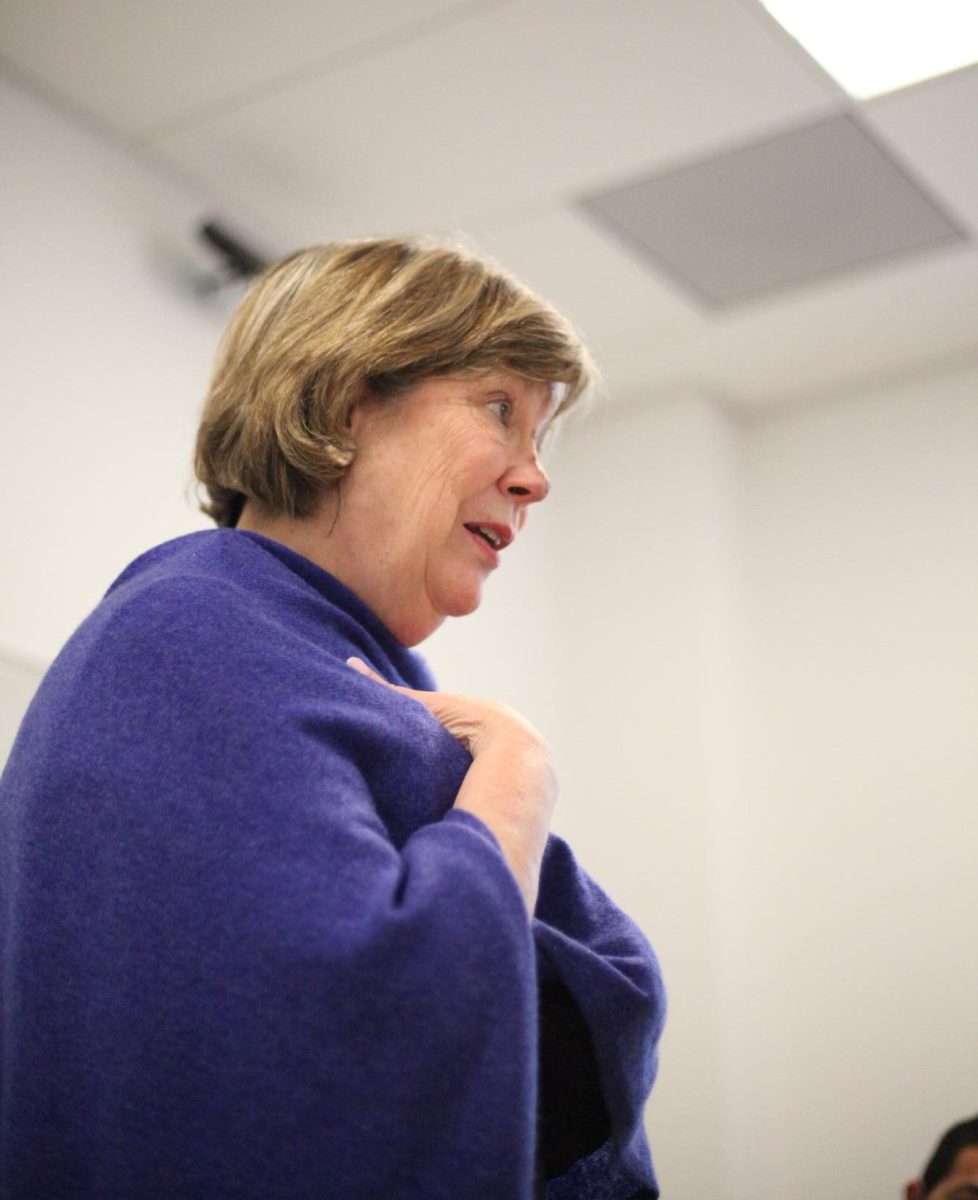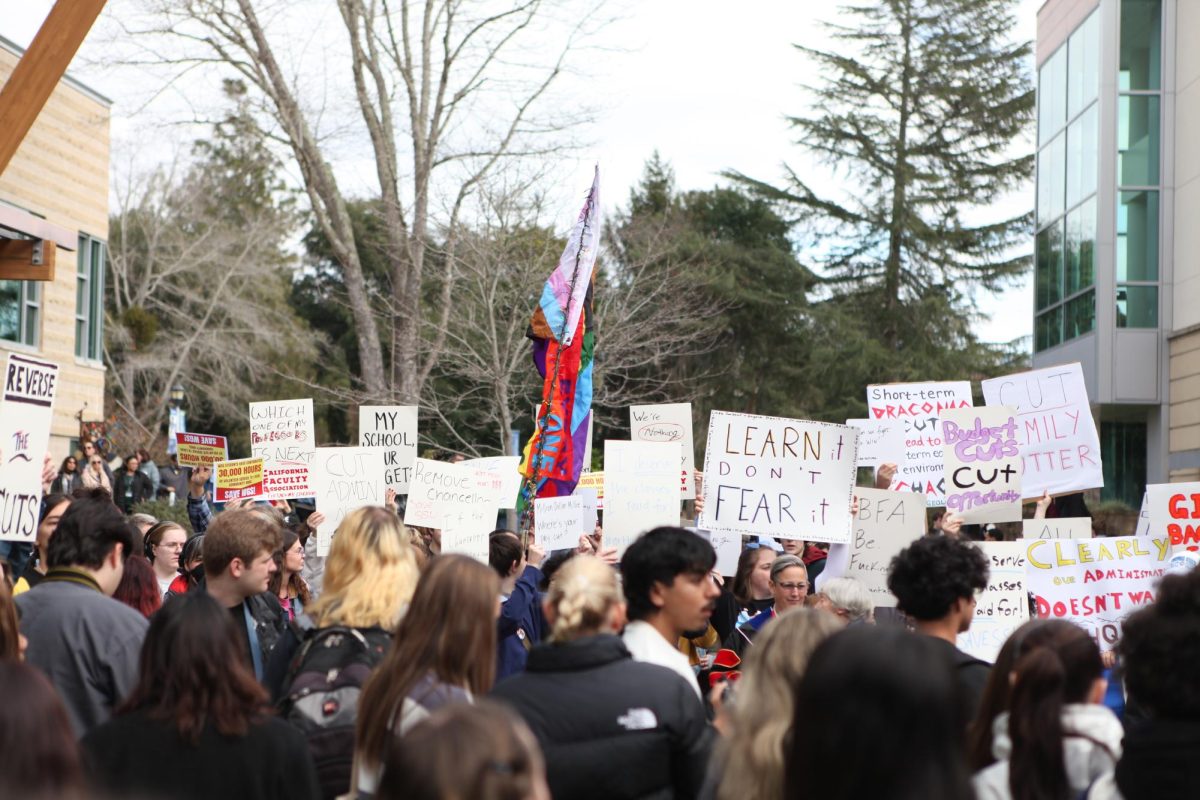As we close out another semester, the 2024-25 school year was one for the books. No doubt we are living in uncertain times.
President Donald J. Trump was inaugurated on January 20, 2025, and no sooner came in with a slew of executive orders threatening our environment, our freedom of speech, our public lands, our jobs, our identities, our right to exist in this country, and our opportunities to pursue higher education.
Two days later on campus, at the start of the spring semester, SSU Interim President Cutrer announced plans to eliminate 22 majors, six academic departments, and all intercollegiate athletics amid a $23.9 million dollar budget deficit and declining enrollment.
The Sonoma State community shared a spectrum of fears amid rapid changes.
Some students — whether they identified as LGBTQIA+ or children of immigrants — wondered if they’d need to go back into hiding. Faculty affected by the cuts voiced uncertainty about whether their decades-long career would continue here in the fall. Many people questioned whether Sonoma State would remain a place that educates its students on environmental challenges or injustice, past and present. Student-athletes wondered if the doors to their athletic futures were closed for good.
Protests against the war on Gaza quieted as Trump and others claimed a call for ceasefire was somehow antisemitic, and students who spoke out across the nation have been targeted by ICE.
While we watched our backs and our mouths, bombs continued to fall on children’s futures across the world, or parents pulled their baby’s bodies from the rubble as we either fought amongst each other at home or tried to look away from the news entirely.
Sonoma State was notorious in the local news with a pending lawsuit filed by student-athletes who had the rug pulled out from under them midway through their degrees.
A new Academic Senate Chair was elected for the upcoming school year at SSU— one with a controversial past.
So yes, the future is maybe more uncertain than usual and undoubtedly daunting. But there is also plenty of triumph amidst the tribulations.
We’ve heard from leaders in our community who had their humble start at Sonoma State, like Senate President Pro Tempore Mike McGuire, CEO of Sonoma Clean Power Geof Syphers, Verity Board President Lianna Hartmour, Stanford University’s Assistant Director for the Office of Inclusion and DEI Bianca Zamora, Memphis Grizzlies’ All-Star rookie athlete Jaylen Wells, and others. All of them expressed hope to preserve crucial opportunities at Sonoma State for future generations.
With perseverance, many of us will walk across the finish line to the next chapter of our lives at the 2025 commencement. And new students will take our seats in the classrooms we once filled.
While SSU stares down a steep debt, its students are walking away richer— certainly not financially but intellectually, spiritually, mentally.
Much to the credit of the professors who continued to suit up and show up to work despite it all — showing us a path to possibility, nurturing our potential, teaching us how to view the world with a critical but compassionate lens, and how to use our voices for positive change. They held space for us (and our smartphone addictions) with patience. They are the magic of this campus.
Smaller classrooms allowed for camaraderie without needing to be in a sorority or fraternity. Whether we found solace in joking about our professors’ quirks, admiring their passion and kindness, or collaborated on projects that helped us all grow — we all had the incredible privilege of receiving a higher education from wise mentors and alongside resilient peers.
At a time in history where so much is at stake and the (bad) news is exhausting, the world needs our voices, our ingenuity, and our courage more than ever.
And all of us, whether student journalists or filmmakers or geologists, WGS majors or future nurses, psychologists, business executives or dancers, musicians, politicians or lawyers, the next person to advance computer science and create potentially life-saving technologies, future school teachers and college professors, philosophers or engineers — we all walk away from this journey having gained something invaluable, and with so much more to give.
Thirty-five years ago, Nelson Mandela said, “Education is the most powerful weapon which you can use to change the world.”
If we’ve made it this far, we know political divisiveness did not break us, record-breaking wildfires, pandemics, global conflicts and financial barriers have not stopped us yet from chasing our dreams and building a better future.






































